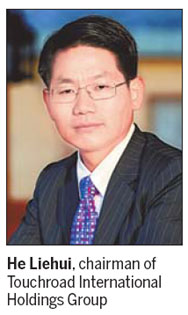Young entrepreneur shares the African dream
Updated: 2011-12-09 08:10
By Zhou Siyu (China Daily)
|
|||||||||||
After graduation, He Liehui's ambition was to become a judge. But nagged by his father, he took a flight to Africa and his whole life changed thereafter. He is today a successful businessman whose ambition is to be at the helm of a Chinese enterprise that ranks among the top 500 companies in the world.
Still in his early 30s, He is too young by Chinese standards to be termed successful. His company, Touchroad International Holdings Group, has more than 500 employees and operates in more than 20 countries in Africa. Many national leaders on the continent are his friends and his African investments span numerous sectors, including mining, services and aviation.
"Africa is a continent full of opportunities. To me, it is of more promise than mature economies such as the United States and Europe," he said.
He bases his assumptions on a decade of hard work and dedication. He first went to Ghana in 2000 and could barely speak English, while his father, one of the earliest Chinese businessmen to invest in Africa, offered him no financial support other than a container of T-shirts.

It was a tough grind for the young He as he had to carry T-shirts weighing dozens of kilograms, from door to door, with just some bread and a bottle of water to last the whole day.
His business gradually picked up. But the decisive point for his "take-off" came with a huge amount of compensation payment to a client. A Nigerian client had ordered clothing worth $700,000 under a deal signed in the early spring of 2001, which he regarded as an auspicious omen for more successes in the coming year.
He knew little about clothing, but soon contacted some Chinese factories and started production. However, with no details of technical requirements stipulated in the contract with the Nigerian client, he could only give the producers a vague description of what he wanted. As a result, the quality of products varied from one factory to another. At last, unsatisfied with the clothing, the client requested a compensation of $200,000.
The amount was too much for He to bear at that time and he could have dismissed the client on contractual grounds. But he did not. Instead, he negotiated with the client and decided to pay the amount in installments.
"African clients are different from clients in the United States or Europe. They emphasize more on mutual trust and less on the contract. To do business in Africa, you should start by cultivating bonds with people," He said.
The Nigerian client was touched by He's sincerity and they became good friends. He then introduced many friends to He, and that put his business on a track of fast development.
"Compared with businessmen from the US and Europe, I believe we Chinese people have a cultural advantage in doing business with Africa. We know how to care for other people's feelings, and this is very important in Africa," He said.
The opening-up of China also helped him in an indirect way. As China entered the World Trade Organization in 2001, the country's market was gradually opening up to the world, which facilitated his overseas development in Africa, he said.
Now with ties between China and Africa getting closer each year, more and more Chinese investors are looking for opportunities in the continent.
"Many industries in African countries are booming without being noticed, such as modern services sector and tourism. These opportunities are very precious," he said. "But above all, you should go and be there. If you have never been in Africa, you will fear it. But once you have been there, you will love it."








